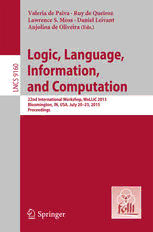Table Of ContentValeria de Paiva · Ruy de Queiroz
Lawrence S. Moss · Daniel Leivant
Anjolina de Oliveira (Eds.)
Logic, Language,
0 Information,
6
1
9
S
and Computation
C
N
L
22nd International Workshop, WoLLIC 2015
Bloomington, IN, USA, July 20–23, 2015
Proceedings
123
Lecture Notes in Computer Science 9160
CommencedPublicationin1973
FoundingandFormerSeriesEditors:
GerhardGoos,JurisHartmanis,andJanvanLeeuwen
EditorialBoard
DavidHutchison,UK TakeoKanade,USA
JosefKittler,UK JonM.Kleinberg,USA
FriedemannMattern,Switzerland JohnC.Mitchell,USA
MoniNaor,Israel C.PanduRangan,India
BernhardSteffen,Germany DemetriTerzopoulos,USA
DougTygar,USA GerhardWeikum,Germany
FoLLI Publications on Logic, Language and Information
SublineofLectures NotesinComputerScience
SublineEditors-in-Chief
ValentinGoranko,TechnicalUniversity,Lynbgy,Denmark
MichaelMoortgat,UtrechtUniversity,TheNetherlands
SublineAreaEditors
NickBezhanishvili,UtrechtUniversity,TheNetherlands
AnujDawar,UniversityofCambridge,UK
PhilippedeGroote,Inria-Lorraine,Nancy,France
GerhardJäger,UniversityofTübingen,Germany
FenrongLiu,TsinghuaUniversity,Beijing,China
EricPacuit,UniversityofMaryland,USA
RuydeQueiroz,UniversidadeFederaldePernambuco,Brazil
RamRamanujam,InstituteofMathematicalSciences,Chennai,India
More information about this series at http://www.springer.com/series/7407
Valeria de Paiva Ruy de Queiroz
(cid:129)
Lawrence S. Moss Daniel Leivant
(cid:129)
Anjolina G. de Oliveira (Eds.)
Logic, Language,
Information,
and Computation
22nd International Workshop, WoLLIC 2015
–
Bloomington, IN, USA, July 20 23, 2015
Proceedings
123
Editors
Valeria dePaiva DanielLeivant
Nuance Communications Department ofComputer Science
Sunnyvale,CA Indiana University Bloomington
USA Bloomington,IN
USA
RuydeQueiroz
CentrodeInformática Anjolina G.deOliveira
Universidade FederaldePernambuco CentrodeInformática
Recife, PE Universidade FederaldePernambuco
Brazil Recife, PE
Brazil
Lawrence S.Moss
Department ofMathematics
Indiana University Bloomington
Bloomington,IN
USA
ISSN 0302-9743 ISSN 1611-3349 (electronic)
Lecture Notesin Computer Science
ISBN 978-3-662-47708-3 ISBN978-3-662-47709-0 (eBook)
DOI 10.1007/978-3-662-47709-0
LibraryofCongressControlNumber:2015942533
LNCSSublibrary:SL1–TheoreticalComputerScienceandGeneralIssues
SpringerHeidelbergNewYorkDordrechtLondon
©Springer-VerlagBerlinHeidelberg2015
Thisworkissubjecttocopyright.AllrightsarereservedbythePublisher,whetherthewholeorpartofthe
material is concerned, specifically the rights of translation, reprinting, reuse of illustrations, recitation,
broadcasting, reproduction on microfilms or in any other physical way, and transmission or information
storageandretrieval,electronicadaptation,computersoftware,orbysimilarordissimilarmethodologynow
knownorhereafterdeveloped.
Theuseofgeneraldescriptivenames,registerednames,trademarks,servicemarks,etc.inthispublication
doesnotimply,evenintheabsenceofaspecificstatement,thatsuchnamesareexemptfromtherelevant
protectivelawsandregulationsandthereforefreeforgeneraluse.
Thepublisher,theauthorsandtheeditorsaresafetoassumethattheadviceandinformationinthisbookare
believedtobetrueandaccurateatthedateofpublication.Neitherthepublishernortheauthorsortheeditors
give a warranty, express or implied, with respect to the material contained herein or for any errors or
omissionsthatmayhavebeenmade.
Printedonacid-freepaper
Springer-VerlagGmbHBerlinHeidelbergispartofSpringerScience+BusinessMedia
(www.springer.com)
Preface
Thisvolumecontainsthepaperspresentedatthe22ndWorkshoponLogic,Language,
Information and Computation (WoLLIC 2015) held during July 19–22, 2015, at the
Department of Computer Science, Indiana University, Bloomington, Indiana, USA.
The WoLLIC series of workshops started in 1994 with the aim of fostering interdis-
ciplinary research in pure and applied logic. The idea is to have a forum that is large
enoughinthenumberofpossibleinteractionsbetweenlogicandthesciencesrelatedto
informationandcomputation,andyetissmallenoughtoallowforconcreteanduseful
interaction among participants.
There were 44 submissions, and each submission was reviewed by at least three
Program Committee members. The committee decided to accept 14 papers. The pro-
gram also included eight invited lectures by Adriana Compagnoni (Stevens Institute,
USA),NinaGierasimczuk(UniversityofAmsterdam,TheNetherlands),JohnHarrison
(Intel, USA), Peter Jipsen (Chapman University, USA), André Joyal (University of
Québec Montréal, Canada), Chung-chieh Shan (Indiana University, USA), Alexandra
Silva (Radboud University Nijmegen, The Netherlands) and Mehrnoosh Sadrzadeh
(QueenMaryUniversityofLondon,UK).TherewerealsofourtutorialsgivenbyNina
Gierasimczuk, John Harrison, André Joyal, and Alexandra Silva.
In remembrance of the 30th anniversary of the death of Julia Hall Bowman
Robinson (December 8, 1919 – July 30, 1985), the American mathematician best
known for her work on decision problems, the program of the meeting included a
screening of George Csicsery’s documentary “Julia Robinson and Hilbert’s Tenth
Problem”(2008).Asatributetoarecentbreakthroughinmathematics,therewasalsoa
screening of Csicsery’s “Counting from Infinity: Yitang Zhang and the Twin Prime
Conjecture” (2015), which centers on the life and work of Yitang Zhang in the cele-
brated Twin Prime Conjecture, the result that there are infinitely pairs of primes sep-
arated by at most 70 million.
We would very much like to thank all Program Committee members and external
reviewersfortheworkthey putintoreviewingthesubmissions. Thehelp providedby
theEasyChairsystemcreatedbyAndreiVoronkovisgratefullyacknowledged.Finally,
wewouldliketoacknowledgethegenerousfinancialsupportbytheIndianaUniversity
School of Informatics and Computing’s Department of Computer Science, and the
scientific sponsorship of the following organizations: Interest Group in Pure and
Applied Logics (IGPL), The Association for Logic, Language and Information
(FoLLI),AssociationforSymbolicLogic(ASL),EuropeanAssociationforTheoretical
VI Preface
Computer Science (EATCS), European Association for Computer Science Logic
(EACSL), Sociedade Brasileira de Computação (SBC), and Sociedade Brasileira de
Logica (SBL).
May 2015 Valeria de Paiva
Ruy de Queiroz
Lawrence S. Moss
Daniel Leivant
Anjolina G. de Oliveira
Organization
Program Committee
Robin Cooper University of Gothenburg, Sweden
Gerard de Melo Tsinghua University, China
Valeria De Paiva Nuance Communications, USA
Catarina Dutlh Novaes University of Groningen, The Netherlands
Martin Escardo University of Birmingham, UK
Nikolaos Galatos University of Denver, USA
Achim Jung University of Birmingham, UK
Sara Kalvala University of Warwick, UK
Elham Kashefi University of Edinburgh, UK
Juliana Küster Filipe University of St. Andrews, UK
Bowles
Daniel Leivant Indiana University, USA
Peter Lefanu Lumsdaine Stockholm University, Sweden
Ian Mackie University of Sussex, UK
Larry Moss Indiana University, USA
Vivek Nigam Universidade Federal da Paraíba, Brazil
Luiz Carlos Pereira PontificalCatholicUniversityofRiodeJaneiro,Brazil
Elaine Pimentel University of Rio Grande do Norte, Brazil
Ruy Queiroz Universidade Federal de Pernambuco, Brazil
Alexandra Silva Radboud University Nijmegen, The Netherlands
Carolyn Talcott SRI International, Singapore
Josef Urban Radboud University Nijmegen, The Netherlands
Laure Vieu Institut de Recherche en Informatique de Toulouse,
France
Renata Wassermann University of São Paulo, Brazil
Anna Zamansky University of Haifa, Israel
Invited Papers
Modeling Language Design for Complex
Systems Simulation
Adriana Compagnoni
Stevens Institute of Technology,NJ07030, USA
[email protected]
The 2013 Chemistry Nobel Prize winners, Karplus, Levitt, and Warshel, were instru-
mental in constructing the first computational models able to predict the effects of
chemical reactions, by combining classical Newtonian physics and quantum physics.
Their contribution was a dramatic demonstration of the long-term trend of computa-
tionalmodelsbecominganessentialtoolinengineeringandscience.Thesemodelsare
used to predict the weather and climate change, estimate drug doses in laboratory
experiments, anticipate the behavior of the stock market, and represent signal trans-
duction pathways, to name a few examples. They are part of everyday life from
recreation to medicine, from finances to education.
Despite its broad spectrum of applications and the vast number of computational
modelsbuilt,modelconstructionremainsprimarilyanad-hocactivity,whereanexpert
or small team creates a piece of software describing the behavior of the agents par-
taking in a specific real world scenario being represented.
An alternative scenario consists of a modeling platform based on a specification
language where the user builds a model by describing agents’ behavior and attributes.
In this talk, I will share our experience in developing a computational modeling
platform, its application to simulating antibacterial surfaces, and the fascinating road
ahead.

